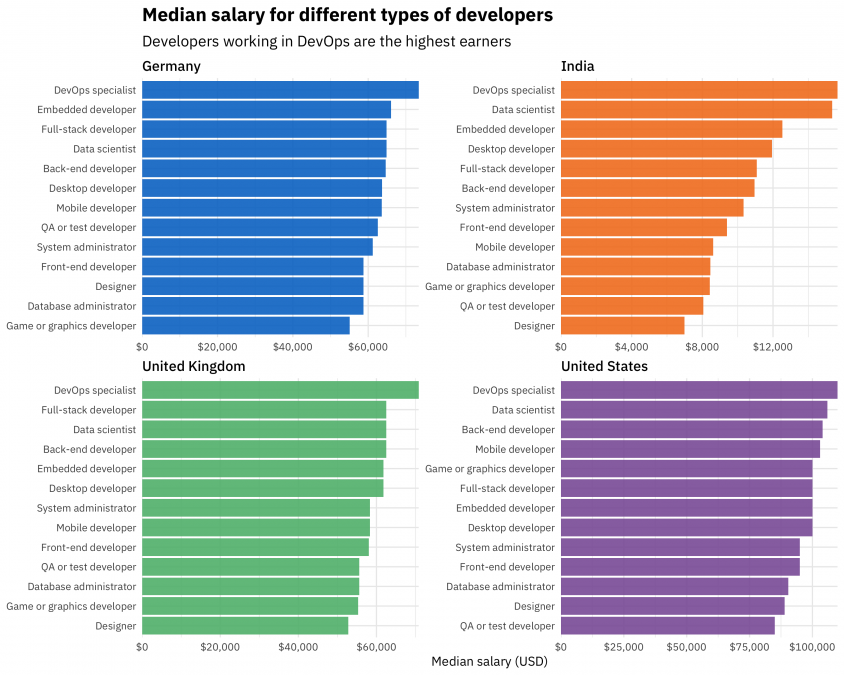Most startups must choose between hiring an in-house development team or outsourcing development to freelancers or agencies. While both approaches have pros and cons, every startup should understand the cost of hiring an in-house development team before deciding – especially because it's higher than most people realize.
Let's take a look at the three highest costs of hiring in-house developers and why you may want to consider outsourcing to avoid them.
The cost of hiring an in-house development team involves more than just wages and benefits – you should factor in recruiting costs, turnover, office supplies, and more.
Recruiting Costs
The U.S. has more than 11 million job openings but only six million unemployed workers amid a stubborn labor shortage. As a result, recruitment has become more difficult and expensive, costing companies an average of $4,000 and 24 days to hire new employees. The tech industry has one of the most competitive job markets in the country.
Many startups use recruiters since they lack a human resources team. These recruiters typically charge between 20% and 25% of their placement's base salary. With software developers earning more than $100,000, these costs can quickly spiral to more than $25,000 for entry-level positions – and much higher for senior-level jobs.
Unfortunately, it's not uncommon for high-tech startups to have a 25% to 30% turnover rate for new hires in their first year. While many new hires leave within their probation period, saving some expense, it’s still costly to go through the recruitment process again. In addition to the time and money, turnover can be highly disruptive to operations.
Wages & Benefits
The median annual wage for a software developer was $110- $140K per annum in 2020, according to the Bureau of Labor Statistics. In addition to a base salary, most employers provide insurance, benefits, paid leave, retirement programs, and supplemental pay that amounts to about 30% of the base salary, or more than $30,000 in the case of an average developer.

DevOps specialists, data scientists, and backend developers are among the highest paid types of engineers. Source: TechRepublic
After hiring a new employee, startups may need to provide industry or tech-specific training that reduces productivity and involves additional cost. And even the most capable new hire will require some onboarding and setup. Unfortunately, industry-specific data is hard to come by, but it's easy to see how these costs could be upwards of $10,000.
Finally, many startups establish a pool of about 10% equity for early key hires and 10% for future employees. While equity offsets some cash compensation, it could become a significant expense if the startup succeeds or a headache if the startup fails. The bigger the option pool, the lower a startup's effective valuation on a per-share basis.
Office Space & Supplies
Office space and supplies may seem like a small price relative to wages and benefits, but it's still an essential part of the calculation. In particular, renting office space may be a considerable expense for a startup in places like San Francisco or New York City. That's especially true when renting Class A properties in prime locations.
In addition to the cost of leasing space, offices require heating, cooling, electrical, water, gas, Internet, maintenance, and cleaning. Startups with employees must also furnish the office with desks, chairs, and interior design elements. And finally, employees will need their own computers and other equipment necessary for their day-to-day.
Silicon Valley Bank reckons that startups need at least 125 to 225 sq. ft. of space per employee, with office furniture adding about $1,500 in cost for each developer. In addition, communal areas, such as a kitchen or conference room, add to the square footage and price.
Should You Outsource?
Hiring an in-house development team can be extremely expensive, which is why many startups outsource development to freelancers or agencies. Freelancers and agencies provide greater flexibility, potentially lower costs, and enable non-technical founders to focus on their core competencies rather than getting lost in the weeds.
Freelancers charge anywhere from $40 per hour in markets with low living costs to $70+ per hour in the U.S. and Australia. Platforms like Upwork make hiring and managing freelance developers easy, but the most skilled developers typically operate their own consultancies. Many provide a combination of business and technical services.
Agencies charge from $75 per hour to more than $850 per hour. But unlike freelancers, they typically have a large pool of developers capable of handling nearly any task. In addition, they usually have a project manager that fills a CTO-like role, enabling non-tech founders to focus on their business rather than on tech considerations.
The decision between a freelancer or agency often comes down to a startup's requirements. Freelancers generally require more hands-on management from an experienced tech lead, whereas agencies offer a more hands-off approach at a higher cost. Agencies also have more well-defined contracts that provide greater reassurances.
The Bottom Line
Startups looking to hire a development team should carefully consider the cost of in-house versus outsourcing to a freelancer or agency. While there are certainly benefits to having an in-house team, many startups may be better off with the lower cost and flexibility of outsourcing to minimize their burn rate and extend their runways as long as possible.
At Intent, we specialize in working with Internet-of-Things and wearables startups. We go beyond the usual development services to optimize user experiences and ensure your long-term success.

Greg Cargopoulos
Marketing Lead

